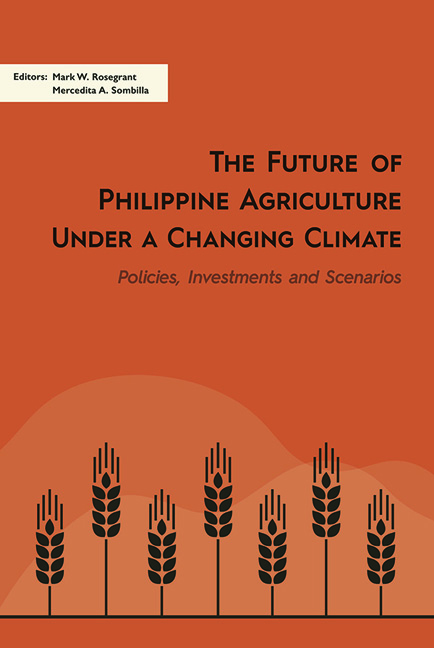Book contents
- Frontmatter
- Contents
- List of Tables
- List of Figures
- List of Appendices
- Preface
- Acknowledgements
- List of Contributors
- PART I Setting up the Scenarios: Current Status and Potential Impacts of Climate Change to Philippine Agriculture
- 1 Current Structure and Future Challenges of the Agricultural Sector
- 2 The Context of Land Cover Changes in Agriculture and Forestry
- 3 Trends in Agricultural Water Resources
- 4 Existing Evidence of Climate Change and Variability
- PART II Climate Change Adaptation Strategies and Sustainability of Philippine Agriculture
- PART III Investments and Supporting Policies to Alleviate Climate Change Impacts to Philippine Agriculture
- PART IV Conclusion
- Index
4 - Existing Evidence of Climate Change and Variability
from PART I - Setting up the Scenarios: Current Status and Potential Impacts of Climate Change to Philippine Agriculture
Published online by Cambridge University Press: 29 May 2019
- Frontmatter
- Contents
- List of Tables
- List of Figures
- List of Appendices
- Preface
- Acknowledgements
- List of Contributors
- PART I Setting up the Scenarios: Current Status and Potential Impacts of Climate Change to Philippine Agriculture
- 1 Current Structure and Future Challenges of the Agricultural Sector
- 2 The Context of Land Cover Changes in Agriculture and Forestry
- 3 Trends in Agricultural Water Resources
- 4 Existing Evidence of Climate Change and Variability
- PART II Climate Change Adaptation Strategies and Sustainability of Philippine Agriculture
- PART III Investments and Supporting Policies to Alleviate Climate Change Impacts to Philippine Agriculture
- PART IV Conclusion
- Index
Summary
Climate change and variability have profound and wide-ranging effects on the agricultural sector, the environment, and society. Global, regional, and local evidences of climate change and variability have grown in recent years, and historical records from the Philippine Atmospheric, Geophysical, and Astronomical Services Administration (PAGASA), combined with past and recent studies, provide evidence that climate change is no longer an anticipated scenario but a reality. Climate change is defined as shifts in mean climate variables or variance in the distribution of climate variables based on historical records over a significant period of time (IPCC 2007, 2014, p. 6). Changes may be evident in temperature and precipitation levels, as well as in other indicators, such as the number of wet and dry days, the number of warm days and cold nights, extremes of climate, and so on.
This chapter presents historical evidences of changes in climate variables at local and national levels. The implications of climate variability and climate change on the agricultural sector are also discussed, along with some beneficial agricultural practices, climate adaptation strategies, and location-specific measures for coping with changing climate at different levels.
LOCAL EVIDENCES OF CLIMATE CHANGE AND VARIABILITY
Observed Trends in Temperature and Precipitation
One of the earliest studies analyzing observed trends climate variables in the Asia and Pacific region, as well as in specific countries, is the work of Manton et al. (2001, pp. 269–84), which made use also of historical data from selected weather gauging stations in the Philippines. Their analyses confirmed that the observed trends are statistically significant. Recently, these results were further updated by Cinco, de Guzman, Hilario, and Wilson (2014, pp. 12–26) using the historical climate data for thirty-four synoptic stations in the archipelago.
Analysis of time-series data on historical yearly mean temperatures (based on available PAGASA data) shows an increasing trend relative to normal values (that is, a thirty-year average for the period 1971–2000). The plot shows that the mean temperature increased by 0.65°C between 1951 and 2010 (Figure 4.1). Averaged across the country, yearly mean temperatures increased at a rate of 0.0164°C per year during 1981–2010, and by 0.0108°C per year during 1951–2010.
- Type
- Chapter
- Information
- The Future of Philippine Agriculture under a Changing ClimatePolicies, Investments and Scenarios, pp. 174 - 208Publisher: ISEAS–Yusof Ishak InstitutePrint publication year: 2018



